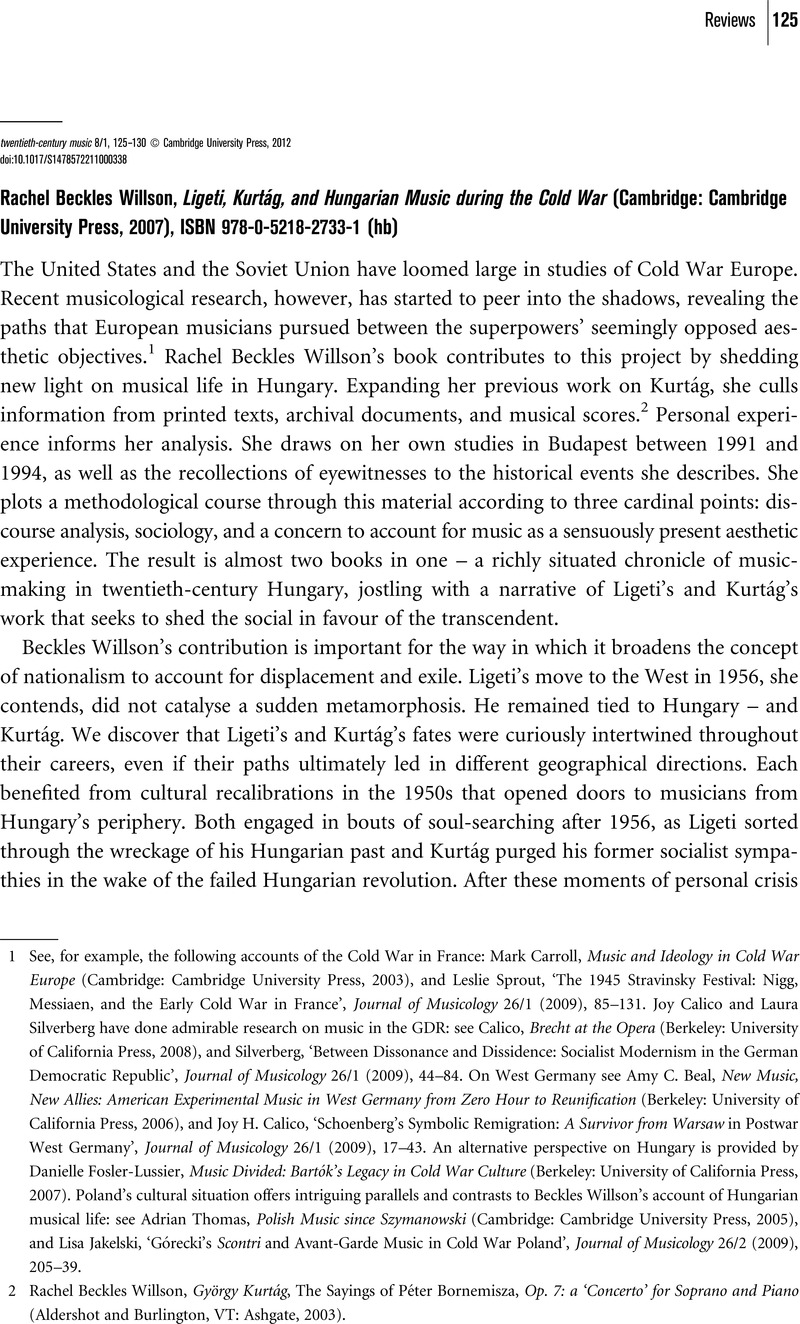No CrossRef data available.
Article contents
Rachel Beckles Willson, Ligeti, Kurtág, and Hungarian Music during the Cold War (Cambridge: Cambridge University Press, 2007), ISBN 978-0-5218-2733-1 (hb)
Published online by Cambridge University Press: 23 February 2012
Abstract

- Type
- Reviews
- Information
- Copyright
- Copyright © Cambridge University Press 2012
References
1 See, for example, the following accounts of the Cold War in France: Carroll, Mark, Music and Ideology in Cold War Europe (Cambridge: Cambridge University Press, 2003)Google Scholar, and Sprout, Leslie, ‘The 1945 Stravinsky Festival: Nigg, Messiaen, and the Early Cold War in France’, Journal of Musicology 26/1 (2009), 85–131CrossRefGoogle Scholar. Joy Calico and Laura Silverberg have done admirable research on music in the GDR: see Calico, , Brecht at the Opera (Berkeley: University of California Press, 2008)CrossRefGoogle Scholar, and Silverberg, , ‘Between Dissonance and Dissidence: Socialist Modernism in the German Democratic Republic’, Journal of Musicology 26/1 (2009), 44–84CrossRefGoogle Scholar. On West Germany see Beal, Amy C., New Music, New Allies: American Experimental Music in West Germany from Zero Hour to Reunification (Berkeley: University of California Press, 2006)CrossRefGoogle Scholar, and Calico, Joy H., ‘Schoenberg's Symbolic Remigration: A Survivor from Warsaw in Postwar West Germany’, Journal of Musicology 26/1 (2009), 17–43CrossRefGoogle Scholar. An alternative perspective on Hungary is provided by Fosler-Lussier, Danielle, Music Divided: Bartók's Legacy in Cold War Culture (Berkeley: University of California Press, 2007)CrossRefGoogle Scholar. Poland's cultural situation offers intriguing parallels and contrasts to Beckles Willson's account of Hungarian musical life: see Thomas, Adrian, Polish Music since Szymanowski (Cambridge: Cambridge University Press, 2005)CrossRefGoogle Scholar, and Jakelski, Lisa, ‘Górecki's Scontri and Avant-Garde Music in Cold War Poland’, Journal of Musicology 26/2 (2009), 205–39CrossRefGoogle Scholar.
2 Beckles Willson, Rachel, György Kurtág, The Sayings of Péter Bornemisza, Op. 7: a ‘Concerto’ for Soprano and Piano (Aldershot and Burlington, VT: Ashgate, 2003)Google Scholar.
3 Judt, Tony, Postwar: a History of Europe since 1945 (New York: Penguin Press, 2005), 103–4Google Scholar.
4 See, for example, Fosler-Lussier, Music Divided, 1–27, and Thomas, Polish Music since Szymanowski, 40–79.
5 For accounts of individual composers’ ‘agency’ in the Soviet context see Tomoff, Kiril, Creative Union: the Professional Organization of Soviet Composers, 1939–1953 (Ithaca, NY: Cornell University Press, 2006)Google Scholar, and Mikkonen, Simo, Music and Power in the Soviet 1930s: a History of Composers’ Bureaucracy (Lewiston, NY: Edwin Mellen Press, 2009)Google Scholar.
6 Gumbrecht, Hans-Ulrich, ‘Production of Presence, Interspersed with Absence: a Modernist View on Music, Libretti, and Staging’, in Music and the Aesthetics of Modernity: Essays, ed. Berger, Karol and Newcomb, Anthony (Cambridge, MA: Harvard University Press, 2005), 345 and 355Google Scholar.
7 Nancy, Jean-Luc, The Birth to Presence, trans. Holmes, Brian and others (Stanford: Stanford University Press, 1993), 368Google Scholar.
8 MacDonald, Ian's The New Shostakovich (London: Pimlico, 2006)Google Scholar is just one example of the simplification that can result from overzealous hermeneutic digging. For a rebuttal see Taruskin, Richard, ‘Public Lies and the Unspeakable Truth: Interpreting the Fifth Symphony’, in Defining Russia Musically: Historical and Hermeneutical Essays (Princeton: Princeton University Press, 1997), 511–44Google Scholar.
9 Brody, Martin, ‘“Music for the Masses”: Milton Babbitt's Cold War Music Theory’, Musical Quarterly 77/2 (1993), 161–92CrossRefGoogle Scholar.
10 Shreffler, Anne C., ‘Ideologies of Serialism: Stravinsky's Threni and the Congress for Cultural Freedom’, in Music and the Aesthetics of Modernity, ed. Berger, and Newcomb, , 218Google Scholar.
11 Timothy Garton Ash has written compellingly on Central Europe. See his The Uses of Adversity: Essays on the Fate of Central Europe (New York: Random House, 1989) and History of the Present: Essays, Sketches, and Dispatches from Europe in the 1990s (New York: Random House, 1999).




